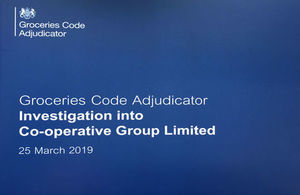Co-op Breached Code finds Groceries Code Adjudicator
The Adjudicator publishes her report into the compliance of Co-operative Group Limited with the Groceries Supply Code of Practice.

Christine Tacon, the Groceries Code Adjudicator, has ordered the Co-op Group to introduce major changes to its governance, systems and processes after carrying out a formal investigation into the retailer.
She found the supermarket group had breached the Groceries Supply Code of Practice on two counts. The retailer failed to provide reasonable notice to suppliers of decisions to de-list products and varied supply agreements unilaterally and without reasonable notice in the way it applied two specific charges.
The GCA launched the investigation on 8 March 2018 after an 18-month period of significant engagement with Co-op during which the retailer accepted it was unable to get to the bottom of issues and could not demonstrate that it had taken remedial action in all the relevant circumstances.
In reaching her findings Ms Tacon interviewed a broad cross-section of Co-op suppliers as well as employees of the retailer and examined documents provided by the Co-op and suppliers.
She found that the retailer de-listed suppliers with no notice or short, fixed notice periods that were not reasonable in the circumstances. It applied standard notice periods which was contrary to the Code and her guidance which specify that notice of de-listing should be considered on a case-by-case basis.
The retailer’s conduct in introducing depot quality control charges and benchmarking charges also breached the Code and the Adjudicator found this caused particular difficulties for suppliers with fixed-cost contracts as they would not be able to amend their cost prices to reflect the increased cost incurred when Co-op applied the charges.
There were weaknesses in training, policies and processes for buyers and the poor functioning of existing IT systems contributed to the retailer’s Code breaches.
Ms Tacon said:
The practices and behaviours described in my report were widespread. Systems, processes, business practices and the ability of different parts of the retailer to affect suppliers’ risks and costs of trading with the company all contributed to Co-op breaking the Code. At the core there was inadequate governance to oversee and manage Code compliance.
The clear conclusion is that Co-op needs to take a very different approach to Code compliance. I have made robust recommendations for urgent action and I will be helping the retailer change its approach by monitoring closely how they implement those recommendations.
The Adjudicator has set down five recommendations for the Co-op to follow:
- Co-op must have adequate governance to oversee and manage its compliance with the Code;
- Legal, compliance and audit functions must have sufficient co-ordinated oversight of Co-op systems to ensure Code compliance;
- Co-op IT systems must support Code compliance;
- Co-op must adequately train on the Code all employees who make decisions which affect a supplier’s commercial arrangements with it; and
- Co-op must in any potential de-listing situation communicate with affected suppliers to enable the retailer to decide what is a significant reduction in volume and reasonable notice.
The Adjudicator will monitor Co-op’s delivery against each of the recommendations and has requested an implementation plan within 4 weeks.
Ms Tacon said:
My recommendations are focused on remedying the root causes of the issues I found and the weaknesses in Co-op’s systems and processes. They are a proportionate and effective measure to reduce the likelihood of future non-compliance by Co-op in these areas and I have decided not to use my fining powers in this instance.
Ultimately, I launched this investigation to help Co-op to get things right for the future. The Co-op will, however, pay the full cost of the investigation and my costs in overseeing the implementation of the recommendations.
Co-op has accepted that its focus at the time was on business recovery and it is clear that the Code was not embedded into its culture as it should have been. It mistakenly assumed that its brand values and desire to work in a certain way meant that it was likely to be acting in accordance with the Code and that if there were any issues with compliance, suppliers would have made the retailer aware of them.
Co-op’s actions were not malicious, it has already repaid those suppliers it has identified as having had charges introduced without sufficient notice and is committed to working with me to change for the better.
This has been an important investigation because it firmly establishes the role of governance and corporate culture in ensuring Code compliance. The most improved retailers, as reported in my annual survey, have all started by accepting how important this is and working to develop a really joined-up approach to compliance at every level in their respective businesses.
My interpretation of the key paragraphs of the Code will apply to all the regulated retailers and I will be talking to them about what this will mean for them. And can I remind suppliers that the GCA annual survey is open now and I urge them to complete it to inform my future work.
Read a full version of the Investigation report.
For more information, please email [email protected] or call 020 3738 6537.